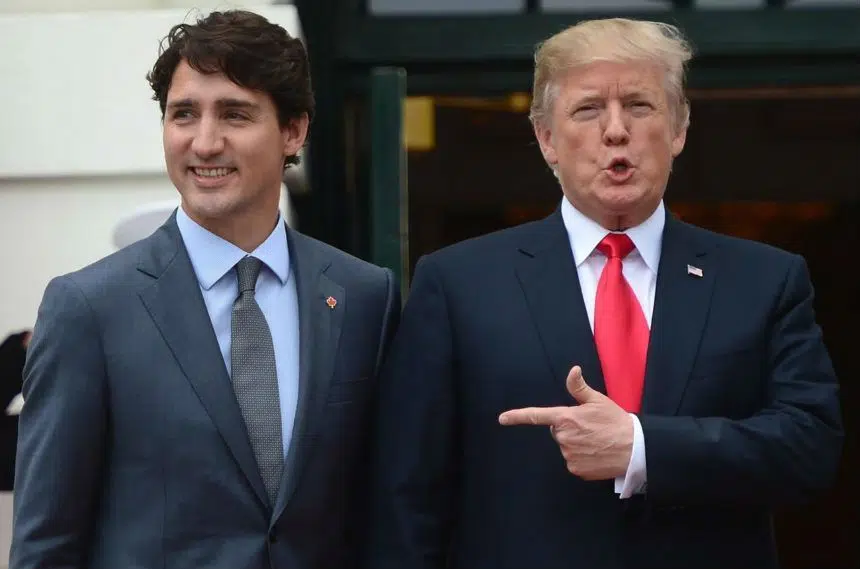WASHINGTON — Prime Minister Justin Trudeau emerged from a day of meetings in the U.S. capital Wednesday continuing to champion a continental trade deal that many around him suggest may be doomed.
But even Trudeau finally acknowledged his enthusiasm for the North American Free Trade Agreement can only go so far and there exists the possibility the trilateral pact with the United States and Mexico is in trouble.
“It is very important and very possible to get a win-win-win … out of these negotiations,” Trudeau told a news conference on the roof of the Canadian Embassy.
“So saying, I think it’s been clear that circumstances are often challenging, and we have to be ready for anything — and we are.”
What anything could look like was raised by U.S. President Donald Trump in his talks with Trudeau earlier Wednesday at the White House.
Terminating the deal is one option he alluded to, and in the past Trump’s said doing so would allow something completely new to be written.
Or perhaps separate bilateral deals with Canada and Mexico will be the way forward, the president suggested.
“It’s possible we won’t be able to reach a deal with one or the other; in the meantime we’ll make a deal with one,” he said.
But the U.S. president also said it’s too early to give up on the negotiations, which resumed Wednesday in nearby Alexandria, Va.
“I think we have a chance to do something very creative that’s good for Canada, Mexico and the United States.”
Trudeau heads Thursday to Mexico for his first official visit to the country and his sit-down with President Enrique Pena Nieto comes as officials in that country appear to be preparing for the deal to collapse.
Mexico’s foreign relations secretary, Luis Videgaray, said Tuesday his country won’t accept “limited, managed trade,” an apparent reference to demands for higher U.S. and regional content rules on products like automobiles.
“We have to be prepared to say no, and if necessary to get up from the table and if necessary leave the treaty,” Videgaray said, adding, “It would not be the end of the world.”
Trudeau wouldn’t say Wednesday at what point Canada might be prepared to walk away, if ever.
But repeating the “ready for anything” sentiment multiple times suggested a conscious decision to acknowledge that the outcome of the talks may not go Canada’s way.
“I continue to believe in NAFTA; I continue to believe that as a continent working together in complementary ways is better for our citizens and better for economic growth, and allows us to compete on a stronger footing with the global economy,” Trudeau said.
“So saying, we are ready for anything and we will continue to work diligently to protect Canadian interests, to stand up for jobs, and look for opportunities for Canadian business and citizens of all of our friends and neighbour countries to do well.”
Trudeau didn’t rule out bilateral deals either.
“We are very aware that there are other potential paths out there, we will address them as they arise.”
Trump’s commerce secretary, Wilbur Ross, said it’s not new that Trump would consider bilateral agreements.
“The president had indicated earlier that he was receptive to a trilateral, or two matching bilaterals, or (ending) NAFTA,” he told a panel discussion late Wednesday.
“I think all he’s really saying is he’s keeping his options open.”
There are multiple sticking points in the talks, some of which were raised at meetings Trudeau held earlier Wednesday with the key House of Representatives committee that oversees trade.
The committee chair, Republican Kevin Brady, called the countries, “great allies,” and said, “when North America wins, America wins.”
But he also asked for more access to Canada’s dairy market. A Democratic colleague called on Canada to loosen its protections for cultural industries, exempted from the current NAFTA.
Trudeau defended Canada’s limits on dairy imports, according to a lawmaker present in the meeting, saying the prime minister countered by pointing out the U.S. has plenty of support programs propping up its own farmers.
– with files from Alexander Panetta and the Associated Press
Stephanie Levitz, The Canadian Press







